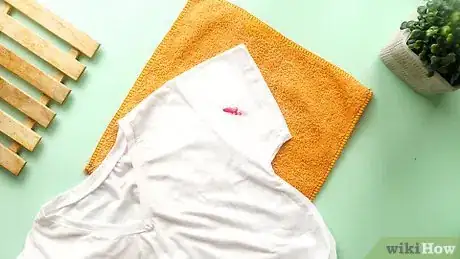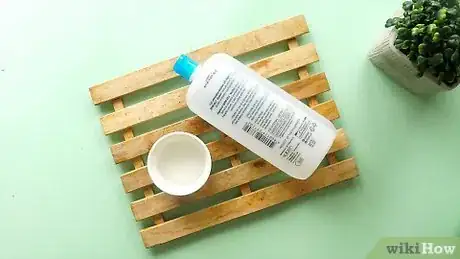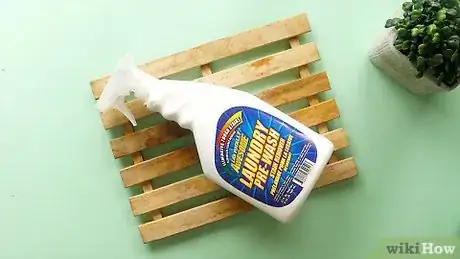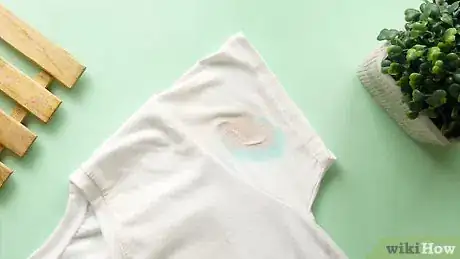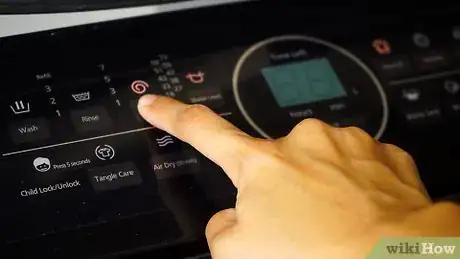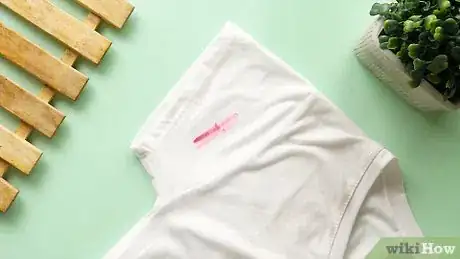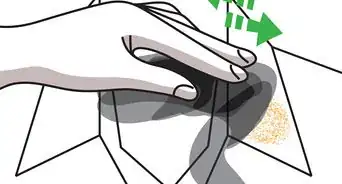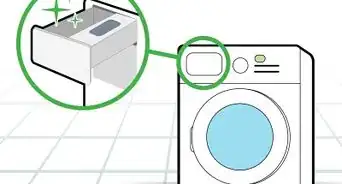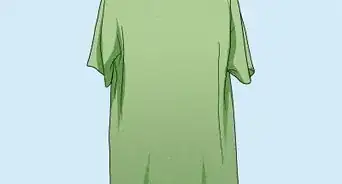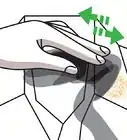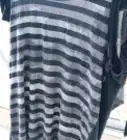This article was co-authored by Regina DeCorte. Regina DeCorte is a Residential Cleaning Specialist and is the Founder of Maid in JC, a home cleaning service based in downtown Jersey City, NJ. With more than eight years of experience, she specializes in cleaning apartments, condos, and townhomes using natural products. Regina and her staff are fully bonded and insured.
This article has been viewed 78,399 times.
Lipstick can look amazing on your face, but on your clothes, it's a very different story. Whether your toddler has taken to sketching amateur cartoons on your dress shirt or your lover has accidentally left a visible "smackeroo" on your collar, the best way to remove lipstick can depend on the precise type of lipstick used as well as the type of fabric used in your clothing. Thus, knowing how to identify both of these factors and treat the stain quickly can make the difference between saving your garment and having to send it to a professional.
Steps
Cleaning Via Absorption
Removing Your Lipstick Stain
-
1Lay the garment stain-down on an absorbent towel. Once you notice a lipstick stain, remove the garment as early as possible. To begin treating it, lay it stained-side down on top of a paper towel or rag — something disposable or that you don't mind staining.
- Make sure the material you lay it on is fairly absorbent and that the floor, table, or counter top underneath isn't vulnerable to stains — if you use a towel that's too thin or work on top of a white surface, you'll risk spreading the stain.
- If using a cloth or sponge, make sure it is clean before use; you don't want to add more grime!
-
2Apply cleaning solution from the reverse side. Next, grab liquid cleaning solution and apply it to the back of the fabric where the stain is. As it works its way into the fabric, it should displace the lipstick in to the towel underneath. On the other hand, scrubbing the stain from the front can actually be counter-productive and spread the lipstick across the fabric.
- You have many possibilities in terms of cleaning solutions — depending on the precise nature of the stain and the fabric of your clothes, different cleaners may be appropriate at different occasions. The following cleaners are discussed in the subsection below — scroll down for more information:[1]
- Dish soap and water
- Acetone and other mineral solvents
- Denatured (rubbing) alcohol
- Ammonia
- Certain commercial stain removal products
- Home-made solutions like lemon juice, vinegar, etc.; or a paste made by mixing baking soda and water
Advertisement -
3Press down with a second absorbent towel. Next, grab a second towel (this one doesn't have to be quite so absorbent) and press down gently on the reverse side of the stain. This should force your cleaning solution (which has now picked up some of the lipstick) into the lower towel, where it will be soaked up.
- As you do this, take care not let your garment or the towel on the bottom move around, as this can spread the stain.
-
4Repeat as needed, replacing towels as they become soggy. Continue soaking the stain with cleaning solution and applying pressure from the reverse side of the fabric until you notice the lipstick stain begin to noticeably lighten. As you go, replace the bottom towel with a fresh towel as soon as it starts to become saturated with liquid — if you don't, the cleaning liquid can soak through to the surface underneath or discolor other parts of your garment.
-
5Finish by laundering. After several cycles of the cleaning method above, you should notice visible improvement in the lipstick stain. At this point, it's a good idea to run the garment through the wash to remove excess cleaner and "finish off" any stain remnants.
- For maximum cleaning power, consider using our instructions below for pre-treating a stained garment prior to doing a load of laundry.
Picking a Cleaning Solution
-
1Use dish soap and water for an easy fix. Compared to other cleaning solutions, a gentle solution of dish soap and water offers a safe "middle ground." It's useful for moving a variety of stains and it's not likely to damage many fabrics, making it a versatile tool. Best of all, it's cheap and readily-available at any local grocery store.
-
2Use a solvent like acetone. Organic solvents (like acetone) can be a big asset when it comes to removing stains from waxier lipsticks, as they are able to break down many of the plastic compounds that can give certain lipsticks this quality (for a demonstration of this, put a chunk of styrofoam in acetone — it should dissolve immediately.) Acetone is safe for all natural fibers and most synthetics, though it can cause colors to bleed.
- Note that acetone is most widely available as nail polish remover. If you want to use commercial nail polish remover as a stain remover, be sure to use the closest variety to pure acetone available that doesn't include added dyes.
-
3Use denatured alcohol. Denatured ("rubbing") alcohol is another great cleaning solution that's cheap and safe for most fabrics. Alcohol is especially useful for microfiber fabrics because, unlike other liquids, it won't penetrate the fibers and cause a permanent stain.[2] Note, however, that like acetone, alcohol can cause colors to bleed.
- Though it's cheap, rubbing alcohol isn't always available in the "cleaning" aisle of grocery stores. You may need to visit a hardware store or pharmacy to find it.
-
4Use ammonia. Ammonia is as famous for its cleaning power as it is for its pungent, somewhat unpleasant smell, so it can be a great choice if you're prepared to work in a well-ventilated area. However, ammonia can harm some fabrics, especially those used in carpeting and upholstery — though these are unlikely to be the same sorts of fabrics used in your clothing, it's a smart idea to "spot test" your garment before using ammonia. In other words, apply ammonia to a small part of the garment that can't usually be seen and let it sit for about 20 minutes, then check to see if the fabric is damaged or discolored.
- In addition, it's worth noting that ammonia can damage no-wax tiles and floors, so avoid working on these surfaces.[3]
- When you use ammonia, it's very important to remember that it reacts with bleach to form toxic gas.[4] Never use ammonia to clean a garment when you intend to launder it with bleach after.
-
5Use a commercial stain remover. Head to the cleaning aisle of any major grocery store and you should see a wide range of cleaning products for sale. These may contain any of the ingredients above (or completely different ingredients), so the usefulness and safety of each will vary from product to product. Be sure to check the product's label or packaging for safety warnings before using it on your garment.
-
6Consider a "natural" treatment. It's also possible to use natural ingredients that you may already have in your kitchen or pantry to remove a wide variety of stains, including those from lipstick. As a general rule, these natural solutions are mild and safe on nearly all fabrics. Below are just a few common suggestions:[5]
- White vinegar (not balsamic or apple cider)
- Lemon juice
- Baking soda and water
- Eucalyptus oil
- Citrus peels
Pre-treating and Laundering
-
1Dab the stain with water. With the right pre-treating strategy, it's possible to get most lipsticks out in the laundry. Start by dabbing the area around the stain with a wet rag to prepare it to absorb detergent.
- Don't rub the water in — as noted above, this can spread the stain.
-
2Scrub carefully with your preferred laundry detergent. Next, apply a small dot of your preferred laundry detergent directly to your stain. If you're working with powder detergent, mix a small amount with water to form a loose paste. Use a soft-bristled brush (like an old toothbrush) to scrub the stain and work the detergent into it.
- For added results, you may also want to work the detergent into the fabric from the reverse side. This is a useful tactic because it helps works the lipstick away from the fabric, rather than into it.
- Be sure to use a detergent that's safe for your fabric — check the garment's care label if you have any doubts.
-
3Allow the detergent to set. Next, give the detergent a chance to soak into the fabric and start to dislodge the stain. This shouldn't take more than 10-15 minutes. While you wait, you can prepare the rest of your laundry load.
-
4Launder on the highest, hottest setting that is safe for your garment. Add your pre-treated garment with a load of other clothes to the washer. As a general rule, hot water and high-intensity wash settings are a little better at cleaning than cold water and gentle washes, so set your washer to the highest settings allowed on your garment's care label.
- Many cleaning resources state that it is safe to wash a lipstick-stained garment with other clothes as long as excess lipstick has been scraped off. If you're concerned about the color from the lipstick staining the rest of the clothes, you may want to wash your garment separately to be safe.
-
5Dry and repeat if necessary. When your wash is done, take your garment out and inspect the stained area. If the stain is still plainly visible, you may need to repeat the pre-treating cycle one or more times to completely eliminate the stain. When you're satisfied with your results, dry your garment.
- If you have clear weather outside, you may want to consider drying your garment in the sun on a drying rack or line. The sun's rays are known to lighten stains during the drying process. However, it's important to note that leaving colored clothes out for days at a time can cause their colors to fade.
Using Petroleum Jelly
-
1Dab a small amount of petroleum jelly on the stain. Believe it or not, petroleum jelly (i.e., Vaseline) can be a powerful stain-removal tool when it comes to lipstick. Using petroleum jelly to remove lipstick from fabric is easy — start by using a finger to gently blot the surface of the stain with a small amount of the jelly.
- Don't work jelly into more of the fabric than is necessary to cover the stain, as, in sufficient quantities, petroleum jelly can be hard to remove from fabric itself. If you are eventually left with a separate stain from the jelly, use rubbing alcohol to treat it.[6]
-
2Launder as normal. Next, with the jelly still on it, toss your garment into the washing machine with a load of laundry. Set the washer to the normal settings for your garment (check the care label if you have any concerns) and let the wash run as normal.
-
3If needed, follow with another stain removal method. When you take your garment out of the wash, the stain should have improved noticeably. If some lipstick still remains, consider repeating this method or using one of the other cleaning suggestions in this article to finish it off.
Using a Classic Hairspray Fix
-
1Spray hairspray generously on the affected area. This old-school method was once a favorite of fashionable young women, but now, anyone can use it. All you'll need to get started is an ordinary bottle of hairspray — most commercially-available varieties should work fine. Begin by spraying plenty of hairspray directly onto the stain, saturating the fabric.
- Note that this method works best if it's performed right after the stain is made, before it has a chance to set. If it's attempted after the stain has had a chance to set, it may not work perfectly.
-
2Let the hairspray set for 10-15 minutes. Next, give the hairspray a chance to soak into the fabric and begin to lift the lipstick away from the fabric. This shouldn't take any longer than 15 minutes.
-
3Dab the excess moisture away. Use a paper towel or a rug you don't mind staining to dab the excess moisture from the fabric. Continue dabbing until you're unable to draw any more liquid out of the fabric.
- As noted above, you'll want to be sure to dab, not scrub, as this can spread the now-loosened stain.
-
4Launder as normal. At this point, if any lipstick remains, you may want to launder the garment to complete the stain-removal process. When done, dry as normal.
- Consider using the pre-treatment method above to enhance the stain-fighting power of your laundry cycle.
Warnings
- Before starting, check the stained garment's care label. Send dry-clean only garments to the dry cleaner's rather than trying to clean them yourself. While the methods below should work for removing lipstick from most garments, some fabrics may be vulnerable to damage⧼thumbs_response⧽
- Avoid using bleach-based cleaners except on white garments — using them on colored clothes can cause unsightly "light" spots.⧼thumbs_response⧽
- Take care when working with acetone or rubbing alcohol — these substances are flammable, so avoid smoking or using them near open flames.[8]⧼thumbs_response⧽
References
- ↑ http://www.housecleaningcentral.com/en/cleaning-tips/stain-removal/lipstick-stain.html
- ↑ http://cleanmyspace.com/rubbingalcohol/
- ↑ http://www.wisegeek.com/is-ammonia-a-safe-cleaning-agent.htm
- ↑ http://www.wisegeek.com/is-ammonia-a-safe-cleaning-agent.htm
- ↑ https://www.apartmenttherapy.com/20-diy-green-cleaning-recipes-141129
- ↑ http://web.extension.illinois.edu/stain/staindetail.cfm?ID=149
- ↑ http://www.housecleaningcentral.com/en/cleaning-tips/stain-removal/lipstick-stain.html
- ↑ http://classroom.synonym.com/lipstick-out-clothes-went-through-washer-11624.html
About This Article
It’s usually possible to get lipstick out of clothes in the laundry. First, gently dab the stain with water, but be careful not to rub it in. Pour a small amount of laundry detergent directly on the stain and scrub it in with a soft-bristle brush. Let the detergent sit on the stain for 10-15 minutes, then launder the item on the hottest setting that’s safe for the fabric. If the stain is still there after you wash the garment, pre-treat it and wash it again. Once the stain is gone, dry the item as you normally would. For more tips, like how to remove lipstick stains with hairspray or petroleum jelly, scroll down.
